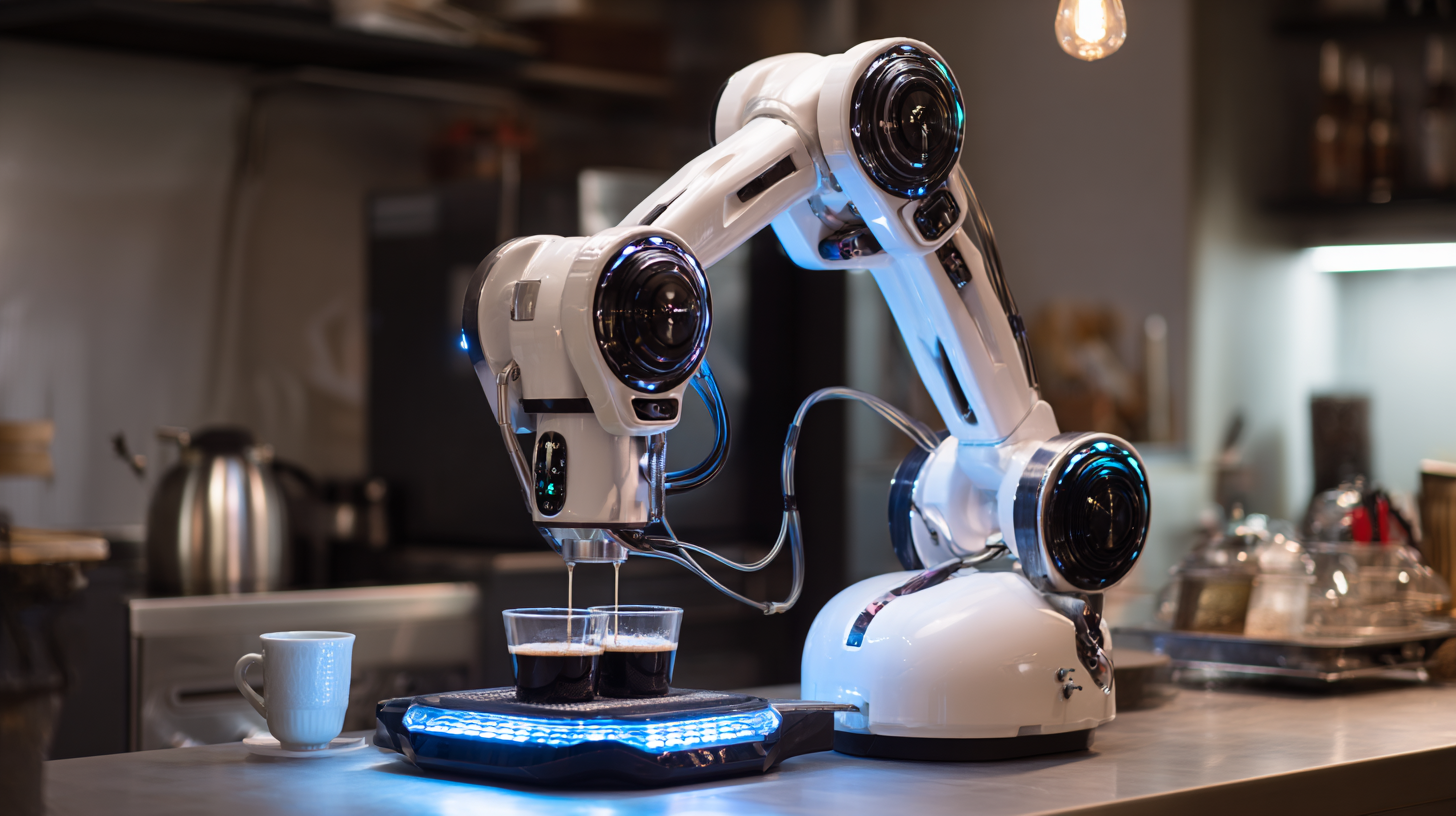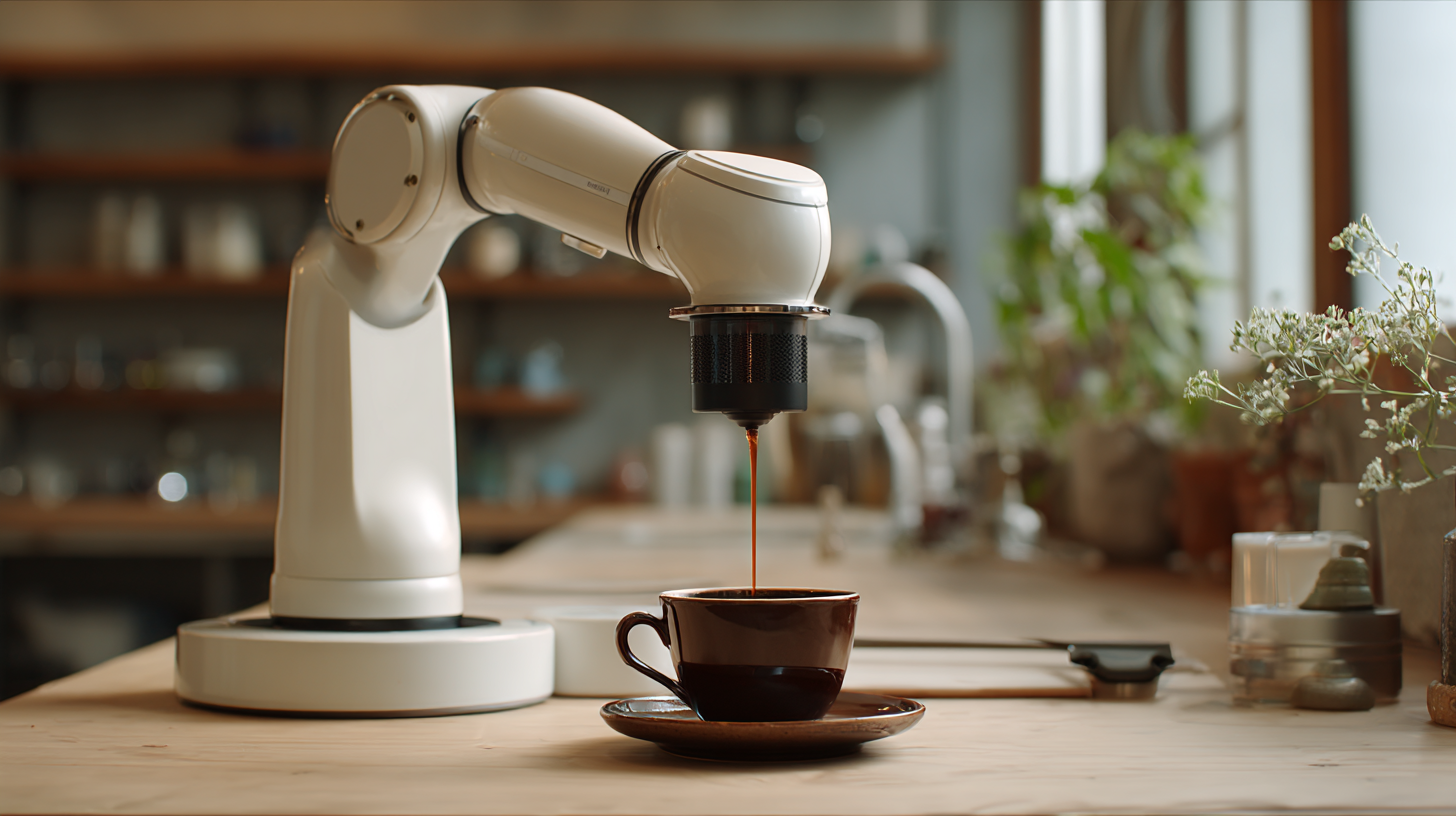Web Menu
Product Search
Exit Menu
How the Coffee Robot Revolutionizes Your Morning Brew: An In-Depth Guide
In recent years, the coffee industry has witnessed a remarkable transformation driven by technological advancements, most notably through the introduction of the Coffee Robot. According to a report by Grand View Research, the global coffee machine market was valued at approximately $12.34 billion in 2022 and is expected to grow at a compound annual growth rate (CAGR) of 4.8% from 2023 to 2030. This surge reflects not just a rise in coffee consumption but also a growing consumer demand for convenience and innovation in brewing methods.
The Coffee Robot epitomizes this shift, offering an automated solution that enhances the coffee-making experience. These robots are equipped with sophisticated features that allow for precision brewing, customization of coffee preferences, and consistency in flavor, addressing the evolving needs of coffee enthusiasts. The National Coffee Association reports that 62% of Americans drink coffee daily, with a significant portion of this demographic seeking technological integration in their everyday routines. As we delve into this in-depth guide, we will explore how the Coffee Robot is not just a novelty but a revolutionary tool that has the potential to redefine your morning brew.

The Rise of Coffee Robots: Transforming the Traditional Brew Experience
The coffee robot revolution is not just a trend; it's reshaping how we experience our daily brew. In the global coffee machine market, which was valued at $7.05 billion in 2023 and is projected to reach $7.36 billion by 2024, we see a remarkable expansion driven by increased coffee consumption and the rise of home brewing. The compound annual growth rate (CAGR) is expected to be 5.10% during this period, indicating a significant shift toward automation and convenience in coffee preparation. Coffee robots, with their ability to replicate barista-level quality, are essential players in this evolution, providing users with a personalized brewing experience right in their kitchens.
As consumers increasingly seek efficiency without compromising quality, the emergence of advanced coffee machines presents a unique intersection of technology and tradition. The growing popularity of automated espresso machines signifies a broader change in consumer behavior—one that favors convenience and innovation. This shift is mirrored in other segments too, with forecasts suggesting that the espresso machine market will flourish between 2025 and 2034. As we embrace the coffee robot era, it's evident that these machines are not merely appliances; they are changing the very essence of coffee culture, making artisanal brews accessible to a wider audience.
Enhancing Consistency: How Robots Ensure a Perfect Cup Every Time
The rise of coffee robots in the modern brewing industry underscores a revolutionary shift towards enhanced consistency in beverage preparation. According to a report by the Specialty Coffee Association, about 35% of coffee consumers prioritize taste consistency, which is often a challenge for manual brewing. Robots utilize advanced algorithms and precision engineering to ensure that each cup of coffee is brewed with exact measurements, optimal temperatures, and consistent brew times. This technological advancement allows for the replication of the ideal cup of coffee, taking the guesswork out of the brewing process.
In addition to taste consistency, coffee robots significantly reduce human error, which can lead to variations in flavor and quality. A recent industry analysis found that machines can eliminate up to 80% of brewing variability compared to traditional methods. By incorporating robotic arms and automated grinding systems, these devices can maintain a uniform grind size and brew pressure, crucial for achieving the perfect extraction. The shift towards robotic solutions in coffee preparation not only elevates the consumer experience but also caters to the growing demand for high-quality coffee in an increasingly competitive market.

The Economic Impact: Cost Savings and Increased Efficiency in Coffee Production
The advent of advanced coffee robots is poised to transform the coffee production landscape significantly. As these automated systems become integral to coffee brewing, they introduce remarkable efficiencies that can reduce costs associated with traditional coffee preparation methods. By streamlining the process—from grinding beans to brewing and even serving—these robots minimize labor costs and reduce waste, making coffee production more economical.
Moreover, the integration of artificial intelligence in agriculture, particularly in coffee production, suggests a future where productivity can be maximized while resource utilization is minimized. Startups leveraging AI technologies are emerging to tackle various challenges faced by coffee producers, from optimizing supply chains to predicting market trends. These advancements not only promise cost savings but also enhance the overall quality of coffee offered to consumers, potentially revolutionizing the market in the long run. The economic impact of these innovations could be profound, leading to sustainable practices and a more competitive coffee industry.
Consumer Preferences: Analyzing the Shift Towards Automated Brewing Solutions
The shift towards automated brewing solutions in the coffee industry reflects changing consumer preferences driven by convenience and innovation. According to a report by the National Coffee Association, approximately 70% of coffee drinkers now prefer automated methods over traditional brewing techniques. This trend highlights the growing demand for features that enhance the user experience, such as programmable settings, touchless operations, and integration with smart home devices. The automation trend is not only about efficiency but also about customizing the brewing process to suit individual tastes—research indicates that 60% of consumers are interested in machines that allow them to adjust brew strength and temperature.
Furthermore, industry analysts project a significant rise in the market for automated coffee machines, estimating it to reach $2.4 billion by 2025, growing at a compound annual growth rate (CAGR) of 8.4%. This growth is fueled by younger demographics who prioritize both technology and quality in their coffee experiences. As more consumers embrace these automated solutions, brands are innovating to offer high-quality, barista-level coffee at home, making the technology not just a luxury but a standard expectation for modern coffee lovers.

Sustainability Through Technology: Eco-Friendly Innovations in Coffee Robotics
The integration of eco-friendly innovations in coffee robotics is a significant trend reshaping the food processing industry. A recent report revealed that the global coffee robotics market is projected to grow at a CAGR of 20% by 2025, driven largely by businesses prioritizing sustainability. By automating the coffee brewing process with energy-efficient technologies, companies reduce waste and energy consumption, aligning with the increasing consumer demand for sustainable products.
Additionally, a European consortium's revolutionary development of a 3D-printed off-road robot demonstrates how recycled materials can transform traditional manufacturing processes. This initiative not only supports environmental goals but also highlights the potential for cost reduction and material efficiency in robotics. As consumers become more environmentally conscious, businesses in the coffee industry are leveraging such technologies to enhance product delivery while minimizing their ecological footprint. This dual focus on technology and sustainability positions coffee robotics at the forefront of modern coffee production, appealing to a market eager for innovative and responsible choices.
How the Coffee Robot Revolutionizes Your Morning Brew: An In-Depth Guide - Sustainability Through Technology: Eco-Friendly Innovations in Coffee Robotics
| Feature | Description | Sustainability Impact | Energy Efficiency (%) | Water Usage (L per cup) |
|---|---|---|---|---|
| Automated Brewing | Fully automated coffee brewing process for convenience. | Reduces waste by optimizing brewing parameters. | 30% | 0.1 L |
| Smart Grinders | Grinds coffee beans to precise particle size for ideal flavor. | Minimizes coffee grounds waste, maximizing flavor extraction. | 20% | 0.08 L |
| Sustainable Bean Sourcing | Works with suppliers practicing fair trade and organic farming. | Supports environmentally friendly coffee production practices. | N/A | 0.15 L |
| Energy Recovery | Recovers heat from brewing to preheat water. | Lowers energy consumption during the brewing process. | 40% | 0.1 L |
| Biodegradable Materials | Utilizes biodegradable parts for machine construction. | Reduces landfill waste from coffee machines. | N/A | 0.12 L |
-
- about us
- About Us
- Qualification
- Privacy
-
- Packaging products
- Hot Sale
- Outdoor Sofa Sets
- Outdoor Dining Sets
- Outdoor Loungers/Sunbeds
- Swing Chairs
- Single Chair

 English
English España
España عرب
عرب 简体中文
简体中文